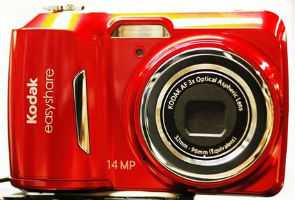- Home
- Cameras
- Cameras News
- Kodak to stop making cameras, digital frames
Kodak to stop making cameras, digital frames
By Associated Press | Updated: 5 June 2012 18:41 IST

Click Here to Add Gadgets360 As A Trusted Source

Advertisement
Picture it: Save for a few disposable point-and-shoots, Kodak is exiting the camera business.
Eastman Kodak Co. said Thursday that it will stop making digital cameras, pocket video cameras and digital picture frames in a move that marks the end of an era for the beleaguered 132-year-old company.
Founded by George Eastman in 1880, Kodak was known all over the world for iconic cameras such as the Brownie and the Instamatic. For the last few decades, however, the Rochester, New York-based company has struggled. It was battered by Japanese competition in the 1980s, and failed to keep pace with the shift from film to digital technology.
The company sought bankruptcy protection from creditors last month in a case that covers $6.7 billion in debt. It has a year to devise a restructuring plan. Citigroup Inc. was approved to lend the company $650 million to continue operating.
Exiting the digital camera business is especially poignant for Kodak. In 1975, using an electronic sensor invented six years earlier at Bell Labs, a Kodak engineer named Steven Sasson created the world's first digital camera. It was an eight-pound, toaster-size device that captured low-resolution black-and-white images.
Reached at home Thursday, Sasson told The Associated Press that seeing Kodak exit the business is "a bit sad" but part of a transition facing all companies that use evolving technology.
"The average person probably owns more digital cameras than they realize," he said. "It's just the reality that digital imaging is a part of our lives and you can capture images in a lot of different ways. There's a lot of choices people have, cellphones being one of them."
Through the 1990s, Kodak spent some $4 billion developing the photo technology inside most of today's cellphones and digital devices. But fearing that it might cannibalize its celluloid film business, Kodak waited until 2001 to bring its own digital cameras to the consumer market. By then, it faced strong competitors like Sony Corp. and Canon.
These days, digital camera sales are suffering as consumers increasingly take photos on smartphones such as the iPhone. Certain smartphone makers such as LG, Nokia, Motorola and Samsung have agreed to pay Kodak to license its digital camera technology, while companies like Apple are fighting its patent claims.
Before Thursday's announcement, Kodak had already been trying to shrink its product line and sell in fewer retail venues, but as sales declines worsened, the company saw no way to make the business profitable.
"We made the logical conclusion that there was no clear path to profitability and we have to focus on generating profits at this point," said Kodak spokesman Chris Veronda.
Kodak said getting out the digital camera business by June should help cut losses by about $100 million a year as it struggles to emerge from Chapter 11 bankruptcy.
The company's digital camera line was part of a rapidly shrinking division that accounted for about a quarter of Kodak's revenue in the three-month period through September.
For the nine months through September, total company sales plunged 18 percent to $4.3 billion and it lost $647 million.
Kodak sees home photo printers, high-speed commercial inkjet presses, workflow software and packaging as the core of its future business. Since 2005, the company has poured hundreds of millions of dollars into new lines of inkjet printers. Once the digital camera business is phased out, Kodak said its consumer business will focus on printing. It will seek a company to license its EasyShare digital camera brand.
Kodak said it's working with retailers to ensure an orderly transition. The company will continue to honor product warranties and provide technical support for the discontinued products.
The company didn't say how many jobs would be eliminated as a result of the decision, but did say that it expects to take a charge of $30 million related to separation costs.
Kodak owns patents that cover a number of basic functions in many smartphone cameras, and the bankruptcy judge has given the company until June 30 to come up with a procedure to sell them.
The company picked up $27 million in patent-licensing fees in the first half of 2011. It made about $1.9 billion from those fees in the previous three years combined. But no buyers have emerged since Kodak started shopping them around in July.
Eastman Kodak Co. said Thursday that it will stop making digital cameras, pocket video cameras and digital picture frames in a move that marks the end of an era for the beleaguered 132-year-old company.
Founded by George Eastman in 1880, Kodak was known all over the world for iconic cameras such as the Brownie and the Instamatic. For the last few decades, however, the Rochester, New York-based company has struggled. It was battered by Japanese competition in the 1980s, and failed to keep pace with the shift from film to digital technology.
The company sought bankruptcy protection from creditors last month in a case that covers $6.7 billion in debt. It has a year to devise a restructuring plan. Citigroup Inc. was approved to lend the company $650 million to continue operating.
Exiting the digital camera business is especially poignant for Kodak. In 1975, using an electronic sensor invented six years earlier at Bell Labs, a Kodak engineer named Steven Sasson created the world's first digital camera. It was an eight-pound, toaster-size device that captured low-resolution black-and-white images.
Reached at home Thursday, Sasson told The Associated Press that seeing Kodak exit the business is "a bit sad" but part of a transition facing all companies that use evolving technology.
"The average person probably owns more digital cameras than they realize," he said. "It's just the reality that digital imaging is a part of our lives and you can capture images in a lot of different ways. There's a lot of choices people have, cellphones being one of them."
Through the 1990s, Kodak spent some $4 billion developing the photo technology inside most of today's cellphones and digital devices. But fearing that it might cannibalize its celluloid film business, Kodak waited until 2001 to bring its own digital cameras to the consumer market. By then, it faced strong competitors like Sony Corp. and Canon.
These days, digital camera sales are suffering as consumers increasingly take photos on smartphones such as the iPhone. Certain smartphone makers such as LG, Nokia, Motorola and Samsung have agreed to pay Kodak to license its digital camera technology, while companies like Apple are fighting its patent claims.
Before Thursday's announcement, Kodak had already been trying to shrink its product line and sell in fewer retail venues, but as sales declines worsened, the company saw no way to make the business profitable.
"We made the logical conclusion that there was no clear path to profitability and we have to focus on generating profits at this point," said Kodak spokesman Chris Veronda.
Kodak said getting out the digital camera business by June should help cut losses by about $100 million a year as it struggles to emerge from Chapter 11 bankruptcy.
The company's digital camera line was part of a rapidly shrinking division that accounted for about a quarter of Kodak's revenue in the three-month period through September.
For the nine months through September, total company sales plunged 18 percent to $4.3 billion and it lost $647 million.
Kodak sees home photo printers, high-speed commercial inkjet presses, workflow software and packaging as the core of its future business. Since 2005, the company has poured hundreds of millions of dollars into new lines of inkjet printers. Once the digital camera business is phased out, Kodak said its consumer business will focus on printing. It will seek a company to license its EasyShare digital camera brand.
Kodak said it's working with retailers to ensure an orderly transition. The company will continue to honor product warranties and provide technical support for the discontinued products.
The company didn't say how many jobs would be eliminated as a result of the decision, but did say that it expects to take a charge of $30 million related to separation costs.
Kodak owns patents that cover a number of basic functions in many smartphone cameras, and the bankruptcy judge has given the company until June 30 to come up with a procedure to sell them.
The company picked up $27 million in patent-licensing fees in the first half of 2011. It made about $1.9 billion from those fees in the previous three years combined. But no buyers have emerged since Kodak started shopping them around in July.
Comments
Get your daily dose of tech news, reviews, and insights, in under 80 characters on Gadgets 360 Turbo. Connect with fellow tech lovers on our Forum. Follow us on X, Facebook, WhatsApp, Threads and Google News for instant updates. Catch all the action on our YouTube channel.
Further reading:
agencynews, apple, cameras, canon, cellphones, digital camera, iphone, kodak, lg, motorola, nokia, point and shoot camera, smartphone, sony, technology
Related Stories
Popular on Gadgets
- Samsung Galaxy Unpacked 2026
- iPhone 17 Pro Max
- ChatGPT
- iOS 26
- Laptop Under 50000
- Smartwatch Under 10000
- Apple Vision Pro
- Oneplus 12
- OnePlus Nord CE 3 Lite 5G
- iPhone 13
- Xiaomi 14 Pro
- Oppo Find N3
- Tecno Spark Go (2023)
- Realme V30
- Best Phones Under 25000
- Samsung Galaxy S24 Series
- Cryptocurrency
- iQoo 12
- Samsung Galaxy S24 Ultra
- Giottus
- Samsung Galaxy Z Flip 5
- Apple 'Scary Fast'
- Housefull 5
- GoPro Hero 12 Black Review
- Invincible Season 2
- JioGlass
- HD Ready TV
- Latest Mobile Phones
- Compare Phones
Latest Gadgets
- Lava Yuva Star 3
- Honor X6d
- OPPO K14x 5G
- Samsung Galaxy F70e 5G
- iQOO 15 Ultra
- OPPO A6v 5G
- OPPO A6i+ 5G
- Realme 16 5G
- Asus Vivobook 16 (M1605NAQ)
- Asus Vivobook 15 (2026)
- Brave Ark 2-in-1
- Black Shark Gaming Tablet
- boAt Chrome Iris
- HMD Watch P1
- Haier H5E Series
- Acerpure Nitro Z Series 100-inch QLED TV
- Asus ROG Ally
- Nintendo Switch Lite
- Haier 1.6 Ton 5 Star Inverter Split AC (HSU19G-MZAID5BN-INV)
- Haier 1.6 Ton 5 Star Inverter Split AC (HSU19G-MZAIM5BN-INV)
© Copyright Red Pixels Ventures Limited 2026. All rights reserved.







![[Partner Content] OPPO Reno15 Series: AI Portrait Camera, Popout and First Compact Reno](https://www.gadgets360.com/static/mobile/images/spacer.png)









